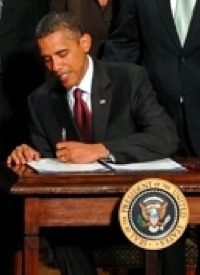
A triumphant and triumphalist President Obama signed the financial overhaul bill into law July 21, promising as he did that “the American people will never be asked again to foot the bill for Wall Street’s mistakes.”
As we have pointed out throughout our coverage of this bill, the mistakes that caused the Great Recession originated not on Wall Street but in Washington, D.C. Recessions and depressions are the outcome of economic bubbles — expansion of money and creidit, leading to steep rises in asset prices coupled with misallocation of capital. Economic contractions such as we have been experiencing since late 2007 or so are attempts by the marketplace to correct the errors and distortions that led to bubble formation.
And what are the sources of systemic errors that cause stock market, real estate, and commodities bubbles and the booms that accompany them? Distortions in the money supply, which in modern finance means too much money and credit creation by central banks like the Federal Reserve. Easy money means soaring prices, and easy credit leads to a mania for borrowing.
Adding to the distorting effects of the monetary policy of central banks — which, emancipated from precious metal standards, can essentially print money at will — are regulatory regimes that create moral hazard and incentivize all sorts of irrational economic behavior. This time around, the regulatory culprits include the Community Reinvestment Act (CRA), which for decades has compelled banks to loan to individuals with poor credit, and the government-sponsored entities Fannie Mae and Freddie Mac, which encouraged the issuance of now-notorious subprime mortgages. Free of such regulatory compulsion, banks and other credit providers would have been reluctant to extend credit to such borrowers or underwrite mortgages on such lax terms. Finally, of course, the tacit promises of federal bailouts for the largest and best-connected financials encouraged reckless behavior.
Yet nothing in the Obama financial overhaul bill does anything to hold Big Government to account for its numerous financial follies. Instead of being abolished or at least subject to congressional auditing and oversight, the Fed has been granted sweeping new powers to regulate the very sector whose implosion the Fed brought about. Instead of abolishing taxpayer-funded bailouts, the new bill gives the FDIC authority to borrow taxpayer monies to use in the liquidation of future failed financials. And the bill makes no mention whatsoever of Fannie Mae and Freddie Mac.
This bill, like most other latter-day legislation emanating from Washington, embodies the irrational hostility for liberty that most lawmakers, Republican and Democrat alike, seem to harbor. And media myrmidons are no better. “[This] law,” writes the AP’s Jim Kuhnhenn, “attempts to catch up to a financial system that has sped ahead of outdated regulation and slackened rules that allowed banks, traders and others to take increased risks.” Well, no, what has actually happened is that the market has tried to find ways to free up financial activity from the stifling hand of federal regulation.
What we have, with banks and other financials, is a partly-socialized financial system, where the flow of money and credit is regulated minutely, and where the money supply itself is wholly monopolized by the state. Instead of merely punishing fraud, as a proper laissez-faire system would do, the federal government is determined to make sure that it never happens in the first place — thereby perpetrating the biggest fraud of them all. For while commercial and investment banks, mortgage lenders, and other financials (including the heretofore untouchable hedge funds) will be subjected to withering scrutiny, the Federal Reserve will continue to operate in near-total secrecy, and entities like the FDIC, Fannie Mae, and Freddie Mac to issue regulations with callous disregard for their long-term consequences.
The new legislation is nothing more than rearranging the deck chairs on our financial Titanic, trying to coerce the free market into obeying the whims of our financial overlords at the Fed and the Treasury. But it has in fact set the dials for the next financial calamity.
Photo of Pres. Obama signing financial overhaul bill: AP Images



